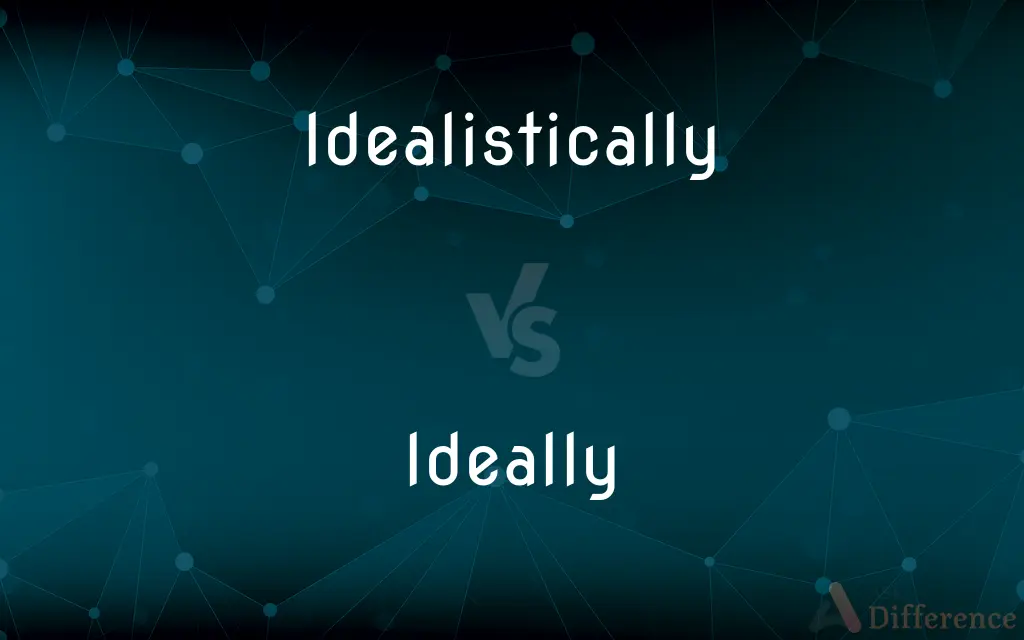Idealistically vs. Ideally — What's the Difference?
By Tayyaba Rehman & Urooj Arif — Updated on March 7, 2024
Idealistically involves adherence to high ideals, often unrealistically, while ideally refers to the best or most perfect scenario.

Difference Between Idealistically and Ideally
Table of Contents
ADVERTISEMENT
Key Differences
Idealistically is characterized by the pursuit or representation of ideal principles, sometimes to the point of impracticality. On the other hand, ideally speaks to an optimal condition or circumstance, often used in the context of what one hopes to achieve under the best circumstances.
When someone acts idealistically, they are driven by a set of perfect standards or beliefs, which might not always align with practical realities. Whereas, when a situation is described as ideally suited, it implies that it meets the most favorable conditions or expectations without necessarily being unattainable.
Idealistically can sometimes lead to disappointment due to the gap between high ideals and real-world constraints. Conversely, ideally is used in a more attainable sense, suggesting a scenario that, while perfect, is considered achievable or realistic within certain contexts.
In terms of application, idealistically is often associated with philosophical, moral, or social ideals, guiding actions and decisions based on a vision of perfection. Ideally, however, is used more pragmatically to describe how situations could unfold in the most favorable manner, without the stringent adherence to lofty principles.
The term idealistically might be used in discussions about utopian societies, where the focus is on achieving a perfect social order, often disregarding practical challenges. Ideally, on the other hand, could be used when planning a project, where the term denotes the best possible outcome given the current circumstances and resources.
ADVERTISEMENT
Comparison Chart
Definition
Adherence to high ideals, often unrealistically
Referring to the best or most perfect scenario
Context of Use
Philosophical, moral, or social ideals
Practical scenarios or desired outcomes
Realism
Often impractical due to high standards
More attainable or realistic expectations
Outcome
Can lead to disappointment or disillusionment
Suggests an optimal but achievable scenario
Application Examples
Utopian visions, ethical standards
Project planning, ideal conditions
Compare with Definitions
Idealistically
May disregard practicality.
Idealistically, she pursued her dream despite financial hurdles.
Ideally
Refers to the best possible scenario.
Ideally, the project will be completed within six months.
Idealistically
Adherence to perfect standards.
He idealistically hoped for a society without conflict.
Ideally
Implies attainability within reality.
Ideally, the weather will remain clear for the event.
Idealistically
Focus on utopian ideals.
The novel presents an idealistically perfect world.
Ideally
Used in practical planning.
Ideally, we would have a larger budget for marketing.
Idealistically
Associated with high moral or ethical principles.
She idealistically advocated for absolute equality.
Ideally
Not bound by stringent ideals.
Ideally, the solution would satisfy all stakeholders.
Idealistically
Often leads to disillusionment.
Idealistically, he was unprepared for the industry's harsh realities.
Ideally
Concerned with optimal outcomes.
Ideally, the new policy will reduce emissions by 50%.
Idealistically
Of, relating to, or having the nature of an idealist or idealism.
Ideally
Preferably; in an ideal world
Ideally, you should exercise for 30 minutes every day
Idealistically
In an idealistic manner.
Ideally
In the best possible way; perfectly
Her experience makes her ideally suited to the job
Ideally
In conformity with an ideal; perfectly.
Ideally
In theory or imagination; theoretically.
Ideally
In an ideal way; perfectly.
Ideally
Given ideal circumstances; preferably.
Ideally, we would have one textbook per student, but unfortunately some of you will have to share.
Ideally
In an ideal manner; by means of ideals; mentally.
Ideally
In an ideal manner;
Ideally, this will remove all problems
Common Curiosities
What does idealistically mean?
Idealistically refers to the adherence or commitment to high and often impractical ideals.
Can idealistically lead to unrealistic expectations?
Yes, because it involves high ideals that may not always consider practical limitations.
How does idealistically differ in application from ideally?
Idealistically is often applied to broad, philosophical contexts, while ideally is used in practical, specific scenarios.
Can idealistically be considered positive?
While it represents a positive aspiration towards high ideals, it can sometimes lead to disappointment if not tempered with realism.
How do idealistically and ideally relate to goal setting?
Idealistically might influence the setting of high, possibly unattainable goals, whereas ideally would guide towards setting optimal but realistic goals.
How is ideally used in a sentence?
Ideally is used to describe the most favorable or perfect condition or scenario, often realistically attainable.
Is ideally always achievable?
Ideally represents an optimal scenario, but it's not always guaranteed to be achievable, although it's considered within the realm of possibility.
How do cultures influence idealistically and ideally perspectives?
Cultural values and norms can shape what is considered idealistic or ideal, influencing individual and collective aspirations.
Can a person be both idealistically and ideally minded?
A person can hold idealistic values while also setting ideally achievable goals, balancing vision with practicality.
Does ideally imply compromise?
Ideally suggests an optimal scenario within given constraints, which may sometimes involve compromise.
Is ideally more practical than idealistically?
Yes, ideally is used in a more practical, achievable sense, as opposed to the lofty standards of idealistically.
How do idealistically and ideally affect decision-making?
Idealistically can influence decisions based on principles or visions of perfection, while ideally focuses decisions on what is best under the circumstances.
Can idealistically be beneficial?
Holding idealistic values can inspire positive change and innovation, but it's important to remain grounded in practicality.
Can businesses operate idealistically?
Businesses can be driven by idealistic principles, but they need to balance these with practical strategies to be sustainable.
Is ideally used in everyday language more than idealistically?
Ideally is more commonly used in everyday contexts due to its practical implications.
Share Your Discovery

Previous Comparison
Hereby vs. Herewith
Next Comparison
Hike vs. TrampAuthor Spotlight
Written by
Tayyaba RehmanTayyaba Rehman is a distinguished writer, currently serving as a primary contributor to askdifference.com. As a researcher in semantics and etymology, Tayyaba's passion for the complexity of languages and their distinctions has found a perfect home on the platform. Tayyaba delves into the intricacies of language, distinguishing between commonly confused words and phrases, thereby providing clarity for readers worldwide.
Co-written by
Urooj ArifUrooj is a skilled content writer at Ask Difference, known for her exceptional ability to simplify complex topics into engaging and informative content. With a passion for research and a flair for clear, concise writing, she consistently delivers articles that resonate with our diverse audience.














































